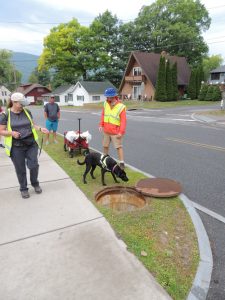By Gordon Woodworth, Chronicle News Editor
Two sewage-sniffing rescue dogs from Maine scoured Beach Road in Lake George Saturday, looking for the source of E. coli pollution that has closed Million Dollar Beach six times in the last three summers.
Pat Dowd of the Lake George Association said, “They are checking for human waste in storm sewers and water pipes and anything else running down to the lake.”
The dogs are from a business called Environmental Canine Services in Otisville, Maine.
“Our dogs are like any other detection dog sniffing out bombs or drugs or investigating arson,” said owner Karen Reynolds.
She guided Remi, a female Labrador Retriever mix, near sewer grates along Beach Road. Her technician Laura Lecker handled Kai, a male Shepherd mix.

When the dogs smell human waste, they alert their handlers.
The two dogs walked along the shore at Million Dollar Beach and “Dog Beach” before the beach opened, and didn’t alert, Mrs. Reynolds said. They then made their way up Beach Road to Bloody Pond Road.
Dogs reacted near the beach
Mr. Dowd said the dogs didn’t alert on Bloody Pond Road, but they did alert in the area between Million Dollar Beach and the Garrison. They returned there Sunday morning before traveling back to Maine.
“We got a number of alerts and as we got them, we pulled water samples when possible,” Mr. Dowd said.
“We’re trying to confirm what we suspect, which is that there is a leak or misconnection or problem where septic water is getting into stormwater somewhere.”
The dogs were followed on their rounds by the LGA’s Jeremy Farrell and Randy Rath and state and village officials.
“We are hoping to find something,” Mr. Rath said. “…We’re getting live readings and then following them up with testing. It will give us a better idea as far as mapping our progress.”
LGA & Town split cost
The LGA and Town of Lake George split the $5,500 cost. The LGA paid $3,500, and the town $2,000, Mr. Dowd said.
Tim Schudt, who runs the Village of ment of Environmental Conservation said the issue of high E.coli counts at Million Dollar Beach “is not an easy problem to solve. It’s a big puzzle, and we’re really working hard to figure out what’s going on.”
As for the dogs, Mrs. Reynolds said, “We imprint the dog on the scent of human waste by giving them very positive reinforcement at the same time, usually pairing the smell with food. The dogs come to love that over time, and then we start hiding the scent…the dogs take a year to fully train, and we now have eight teams of dogs and a handler across the United States.”
Grew out of meeting in Glens Falls
The dogs’ use at Lake George grew out of “a conference in April in Glens Falls…that’s where I met Randy and Jeremy,” said Mrs. Reynolds. It was the New England Interstate Water Pollution Control Commission’s 29th annual Nonpoint Source Pollution Conference.
Mrs. Reynolds was presenting, and Mr. Rath, project manager for the Lake George Association, was sitting in the front row.
He says, “My immediate reaction was to turn around and quietly say to Joe Thouin of the Lake George Park Commission, ‘We need her in Lake George right now!’
Mr. Rath said he and Mr. Farrell approached her after the meeting. They brought Mrs. Reynolds and Remi up to Beach Road the next day, looking to bring her back this summer.
“We wanted her here now, during the busy season,” Mr. Farrell said.
Copyright © 2018 Lone Oak Publishing Co., Inc. All Rights Reserved.
 Glens Falls Chronicle Serving the Glens Falls/Lake George region; Warren, Washington and northern Saratoga counties since 1980
Glens Falls Chronicle Serving the Glens Falls/Lake George region; Warren, Washington and northern Saratoga counties since 1980

